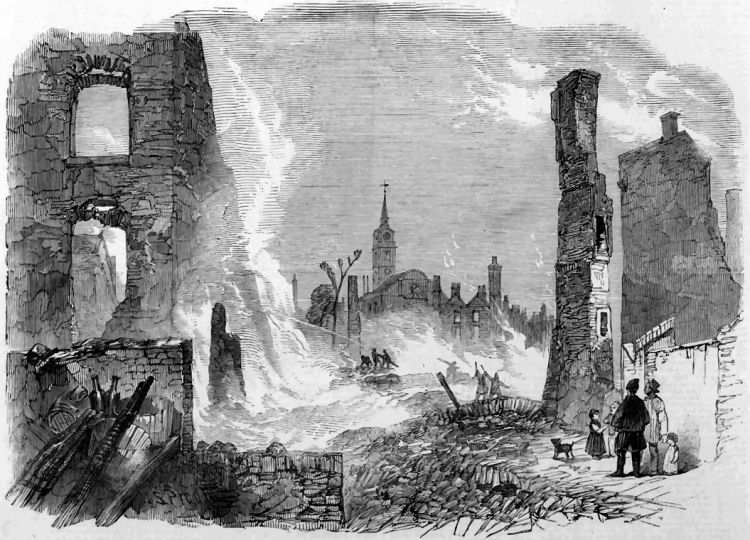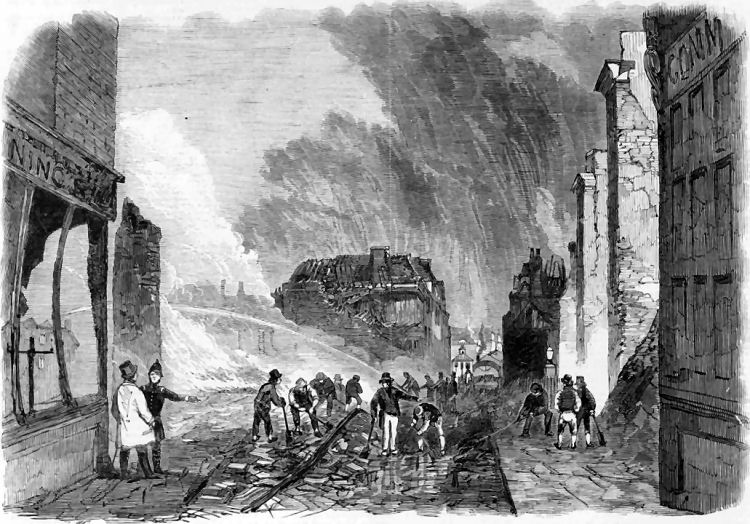|
From the Illustrated London News, 17 August, 1850.
CONFLAGRATION AT GRAVESEND.

Above engraving
showing the fire looking West.
A most extensive and destructive fire occurred in Gravesend on Sunday
morning last, at about two o’clock. The fire was first observed in the
house of Mr. J. Adlington, a grocer and tea-dealer, No. 65, in the
High-street, nearly-facing the Town Hall, and it was at that time very
inconsiderable; but in the absence of a supply of water it made rapid
progress, and before the residents became aware of its existence the
back of their dwellings in Church-alley, High-street, and Princes-street
were cracking with the intense heat.

Above engraving showing the High Street fire looking
north.
The High-street is, considering it is the principal place of business in
the town, an exceedingly narrow thoroughfare, not sufficiently wide in
any part for two vehicles to pass without inconvenience. At the back of
this street was Princes-street, whilst West-street bounded the northern
end, and Church-alley ran at the southern extremity of the "White Hart
Inn." The whole clump of buildings standing within these boundaries was
about 50 or 60, and covered probably a couple of acres of ground. Many
of these, notwithstanding that
they were three or four stories high, and contained goods of some
thousand pounds value, were constructed principally of timber, so that
the officers of police became aware that, unless strenuous exertions
were made, some of the inhabitants must lose their lives. They therefore
aroused the whole of the occupants of those premises. In a very short
space of time the town engines, together with those of the Custom House,
and of Mr. Plane’s (the Mayor) brewery, were on the spot; and a supply
of water from the mains of the water-works having been promptly got,
every effort was made to subdue the fire, which by this time had
extended itself to the house adjoining Mr. Adlinton’s. The wind blew
rather fresh from the south-west, sweeping the flames over the houses
down the High-street towards the Town-pier. The engines, though well
worked and abundantly supplied with water, gained no influence over the
fire, which had at about three o’clock extended to seven houses on that
(the western) side of the street. The engine from Tilbury Fort,
accompanied by a body of troops, having now arrived, more vigorous, but
equally unavailing efforts were made to stay the further progress of the
fire, which had, at soon after three o’clock, crossed the street,
seizing first upon the extensive premises of Mr. Young, butcher. From
there the flames spread to the houses all down the eastern side of the
street, including the County Bank, the Savings-Bank, the "Kent Tavern," Brinchley’s Distillery, &c. The High-street, on both sides from the
Town-hall downwards, to within a short distance of the Town Pier, was at
four o’clock completely enveloped in flames, which, when they involved
the premises of Mr. Troughton, tallow-chandler, and an oil-shop and
chemist’s shop contiguous to it, formed an awful conflagration. At this
time, all hope of preserving a single house between the Town-hall and
the pier was abandoned by all parties, notwithstanding that the Dartford
and Rochester engines had arrived, and a prodigious volume of water was
discharged on the whole line of burning houses on both sides of the
street. There was, fortunately, sufficient time to save the cash-boxes
and the securities and other documents of the County and Savings Banks,
which were taken to the Customhouse, all the officers of which were
actively engaged, with the military police, and townspeople, in working
the engines. Comparatively little property was saved from the fire,
which, between five and six o’clock, had completely destroyed
twenty-four houses (as the annexed list will show) on both sides of
High-street, independently of several houses in Princes-street and the
courts leading out of High-street, between the Town-hall and the Pier. A
telegraphic communication from the railway station, at the instance of
the Mayor (Mr. Plane), having been made to the London-bridge station, a
body of the Fire Brigade and two engines were as soon as possible
despatched from London, and arrived in Gravesend at about twenty minutes
to seven o'clock. The work of destruction was then done, the fire having
been providentially stayed in its progress down the High-street, and
extending backwards to Princes-street, by a change of wind to the north
and westward at six o’clock. The assistance of the Brigade, with their
powerful engines and practised skill, was, however, effectual in
suppressing the fire still bursting forth from the mighty mass of
ruins—all that remained of the property destroyed.
There is much suspicion entertained respecting the origin of the fire,
which, it is thought, began not in the house of Adlington, but in a
cigar shop, next door, kept by a man named Reed.
The general body of trades-people and inhabitants of the town are loud in
their complaints against the corporation in not having an efficient
corps of firemen and engines established, after the warning they
received by the two previous fires, which it will be recollected
consumed the greater part of the lower portion of Gravesend.
The largest building among the premises burnt down was used as the
London and County Bank. It occupied much ground on the east side of
High-street, close to the Town-hall, and with its contents was insured
for £10,000. The clerks succeeded in saving the whole of the books,
cash, and pipers belonging to the bank.
It was supposed that a man named Vallance had lost his life during the
raging of the fire by the floors of one of the houses in High-street
falling on him. We are happy to say it is not so; the police have
ascertained that he escaped.
It is the general opinion of the inhabitants in the town, that had the
corporation telegraphed for the London engines when the fire was
crossing high-street, instead of waiting three hours, a very large
portion of the property would have been preserved.
The loss, as estimated by the surveyors of the various London insurance
companies. is £80,000. The offices that will principally suffer are the
following, and the amounts are reported thus:—Kent Fire-office, £10,000;
Globe, £8000, Royal Exchange, £8000, Alliance, £4000; Norwich Union,
£7000; Phoenix, £7000; Mutual, £2000; West of England, £5000; Star,
£3000; Commercial, £2000. Total, £65,000.
Subjoined is a copy of Mr. Braidwood’s official report of the damage
done:—
Sunday, August 11, 1850.— Called by an electric telegraph message to a
fire in High-street, Gravesend, which did the following damage:— No. 65,
High-street, J. Adlington, grocer, burned down. No.66, M. Reed,
tobacconist, burned down. No. 67, T. C. Barber, currier, totally
destroyed. No. 68, burned down. No. 69, E. and M. Gregory, drapers,
totally consumed. No. 70, unoccupied, burned down. Nos. 71 and 72, J. T.
Fenwick, clothier, burned down. No. 73, Mr. C. Day, surgeon, premises
partially destroyed. No. 74, W. Saunders, surgeon, seriously damaged.
No. 64, Messrs. Troughton and Co., tallow-chandlers, premises destroyed.
No. 63, Mr. Henry Creed, victualler ("Parr's Head"), burned down. No.
62, J. H. Hatton, draper, &c., totally consumed. No. 61, W. Newman,
stationer, burned down. No. 60, R. Jerrey, eating-house keeper,
seriously damaged. No. 22, R. Culley, refreshment rooms, damaged. No.
21, C. Spenser, chemist, burned down. No. 20, J. Temple, tavern keeper,
("Kent
Tavern") totally destroyed. No. 19, C. Lipscombe, perfumer, burned down. No. 18,
L. Young, butcher, burned down. No. 17, the London and County Bank,
totally consumed. High-street Distillery, J. Benchley, dwelling-house,
burned down, roof of distillery broken, and considerable damage by water
and removal. No. 16, J. R. May, boot-maker, burned down. No. 15, Thomas
Butcher, confectioner, burned down. No. 14, Mr. H. Newman, stationer,
burned down. No. 13, unoccupied, destroyed. No. 12, W. Croft, grocer,
seriously damaged. No. 1, Church-alley, let out in tenements, burned
down. Nos. 2, 3, 4, and 5, similar damage. No. 1, Prince’s-street, C.
Yomvin, pipe-maker, great damage by removal, &C. No. 2, ditto, H.
Stocks, bricklayer, similar damage. Nos. 4 and 4 1/2, ditto, Mr. Bell,
roof destroyed; rest of building and contents damaged. No. 5, J. Perry,
poulterer, burned down. No. 29, Messrs. Peters, smith, front severely
scorched. Swan-yard, let out in tenements, buildings burned down.
H. Eleing, stable-keeper, great damage to premises by fire and water.
On Wednesday, an inquiry of some hours' duration was held at the Town
Hall, for the purpose of ascertaining how the fire originated. The
following magistrates conducted the investigation; namely, Mr. Plane
(the mayor), and Messrs. Oakes, Spencer, Ridge, Tickner, Troughton, and
Ditchburn. After hearing a good deal of evidence as to the origin of the
fire, the Bench decided that the present inquiry would prevent the
expense of a coroner’s inquest, and the proceedings terminated, no
conclusion being formed as to the origin of the fire.
|

